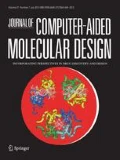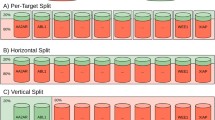Abstract
The docking performance of the FRED and HYBRID programs are evaluated on two standardized datasets from the Docking and Scoring Symposium of the ACS Spring 2011 national meeting. The evaluation includes cognate docking and virtual screening performance. FRED docks 70 % of the structures to within 2 Å in the cognate docking test. In the virtual screening test, FRED is found to have a mean AUC of 0.75. The HYBRID program uses a modified version of FRED’s algorithm that uses both ligand- and structure-based information to dock molecules, which increases its mean AUC to 0.78. HYBRID can also implicitly account for protein flexibility by making use of multiple crystal structures. Using multiple crystal structures improves HYBRID’s performance (mean AUC 0.80) with a negligible increase in docking time (~15 %).







Similar content being viewed by others
References
Cross JB, Thompson DC, Rai BK, Baber JC, Fan KY, Hu Y, Humblet C (2009) Comparison of several molecular docking programs: pose prediction and virtual screening accuracy. J Chem Inf Model 49:1455–1474
Warren GL, Andrews CW, Capelli A, Clarke B, LaLonde J, Lambert ML, Lindvall M, Nevins N, Semus SF, Senger S, Tedesco G, Wall ID, Woolven JM, Pieshoff CE, Head MS (2006) A critical assessment of docking programs and scoring functions. J Med Chem 49:5912–5913
McGann MR (2011) FRED pose prediction and virtual screening accuracy. J Chem Inf Model 51:578–596
Cummings MD, DesJarlais RL, Gibbs AC, Mohan V, Jaegar EP (2005) Comparison of automated docking programs as virtual screening tools. J Med Chem 48:962–976
Nicholls A (2008) What do we know and when do we know it? J Comput Aided Mol Des 22:133–139
Tuccinardi T, Botta M, Giordano A, Martinelli A (2010) Protein kinases: docking and homology modeling reliability. J Chem Inf Model 50:1432–1441
Hawkins PCD, Skillman AG, Warren GL, Ellingson BA, Stahl MT (2010) Conformer generation with OMEGA: algorithm and validation using high quality structures from the protein databank and Cambridge structural database. J Chem Inf Model 50:572–584
Perola E, Charifson PS (2004) Conformational analysis of drug-like molecules bound to proteins: an extensive study of ligand reorganization upon binding. J Med Chem 47:2499–2510
Brown RD, Martin YC (1997) The information content of 2D and 3D structural descriptors relevant to ligand-receptor binding. J Chem Inf Model 37:1–9
http://www.eyesopen.com/graphsim-tk. Accessed 30 April 2012
Hartshorn MJ, Verdonk ML, Chessari G, Brewerton SC, Mooij WTM, Mortenson PN, Murray CW (2007) Diverse, high-quality test set for the validation of protein-ligand docking performance. J Med Chem 50:726–741
Jain A (2008) Bias, reporting and sharing: computational evaluations of docking methods. J Comput Aided Mol Des 22:201–212
Huang N, Shoichet BK, Irwin JJ (2006) Benchmarking sets for molecular docking. J Med Chem 49:6789–6801
Olah M, Mracec M, Ostopovici L, Rad R, Bora A, Hadaruga N, Olah I, Banda M, Simon Z, Mracec M, Oprea TI (2004) Chemo informatics in drug discovery. In: Oprea TI (ed) WOMBAT: world of molecular bioactivity. Wiley-VCH, New York
Author information
Authors and Affiliations
Corresponding author
Rights and permissions
About this article
Cite this article
McGann, M. FRED and HYBRID docking performance on standardized datasets. J Comput Aided Mol Des 26, 897–906 (2012). https://doi.org/10.1007/s10822-012-9584-8
Received:
Accepted:
Published:
Issue Date:
DOI: https://doi.org/10.1007/s10822-012-9584-8




